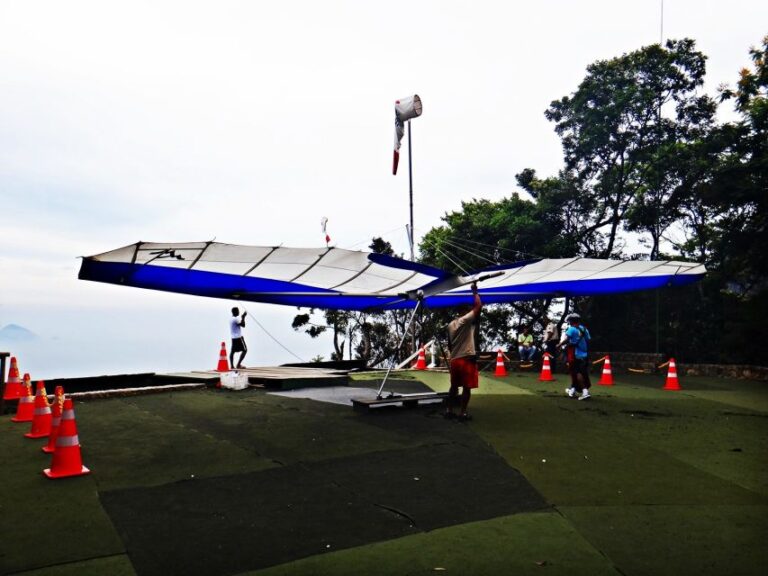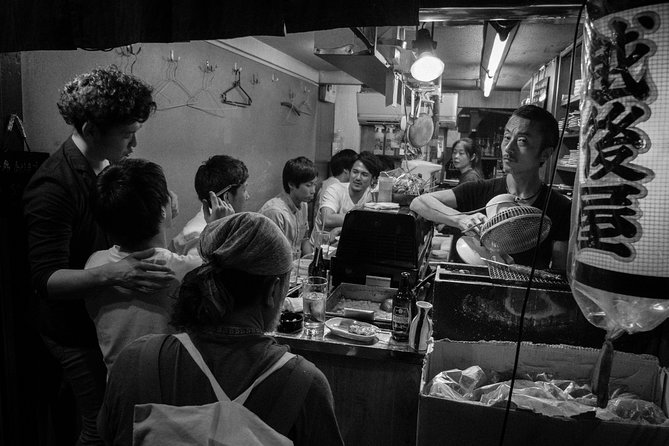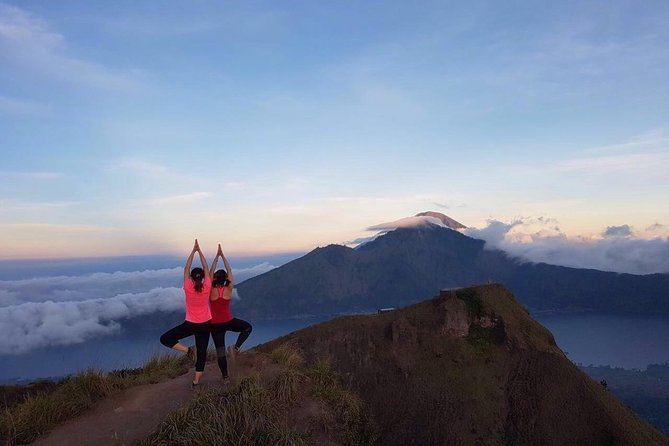Set out on a cultural voyage that transcends time and tradition with the ‘Three Japanese Cultures Experience in One Day With Simple Kimono’. This immersive encounter offers a glimpse into the intricate tapestry of Japan’s heritage, blending the art of tea ceremonies, origami, and the elegance of kimono attire.
As you navigate through the refined customs and contemporary sensibilities, be prepared to uncover hidden gems that showcase the essence of Japanese culture. Stay tuned to discover how this unique experience unveils the beauty and significance of preserving Japan’s rich cultural legacy.
Key Points
- Immerse in tea ceremonies, calligraphy, and sake tasting for a rich Japanese cultural experience.
- Appreciate kimono’s significance and design artistry for a deeper understanding of Japanese heritage.
- Engage in traditional activities for an authentic connection to Japanese customs and traditions.
- Experience genuine culture through hands-on participation in three iconic Japanese practices.
Benefits of Experiencing Three Japanese Cultures
Experiencing the three Japanese cultures through the simple kimono offers a unique opportunity to take in the rich traditions and customs of Japan. This culture allows participants to gain a deeper understanding of Japanese traditions by actively engaging in activities such as tea ceremonies, calligraphy, and sake tasting.
By wearing the kimono, you can appreciate the significance of this traditional garment and the artistry behind its design. Engaging in these activities while dressed in a kimono provides a sense of authenticity and connection to Japanese heritage.
What to Expect During the Experience
Enjoy the rich traditions of Japan by donning a simple kimono and partaking in authentic cultural activities.
During this experience, you can expect a deep culture where you will learn about Japanese customs and traditions firsthand.
Respect for kimono etiquette is paramount, so be prepared to follow guidelines such as how to wear the kimono properly and the significance of different colors and patterns.
You will also have the opportunity to engage in traditional Japanese activities like tea ceremonies, calligraphy, or even trying on a samurai helmet.
This hands-on experience will provide you with a genuine taste of Japanese culture and leave you with a newfound appreciation for the country’s heritage.
Simple Kimono Dressing Guide
Prepare for your cultural experience with a step-by-step guide on dressing in a simple kimono. To fully learn about the Japanese culture, follow these easy steps.
Begin by putting on the juban, a thin white undergarment that goes beneath the kimono.
Next, wrap the kimono around your body, ensuring the left side crosses over the right and tie the obi sash firmly around your waist. Remember, in Japanese culture, the right side over left is reserved for the deceased, so be mindful of this kimono etiquette.
To complete your look, fold the collar down and adjust the length to ankle height. By mastering this dressing guide, you’ll not only look the part but also experience a true sense of culture.
Traditional Japanese Tea Ceremony Overview
The Traditional Japanese Tea Ceremony offers a serene and culturally enriching experience for participants.
- Tea ceremony etiquette: Respectful behavior is crucial during the ceremony.
- Japanese tea rituals: Each step in the ceremony holds symbolic meaning.
- Proper attire: Participants often wear traditional clothing like kimonos.
- Serving tea: The host serves tea to guests with precise movements.
- Silent contemplation: Quiet reflection is encouraged while enjoying the tea.
Ikebana Floral Arrangement Workshop Details
After exploring the serene and culturally enriching Traditional Japanese Tea Ceremony, participants can now engage in an Ikebana Floral Arrangement Workshop to further enjoy Japanese artistic traditions.
| Ikebana Workshop Details | |
|---|---|
| Duration: | 1.5 hours |
| Location: | Traditional studio |
| Inclusions: | Guidance, materials |
The Ikebana workshop offers a hands-on experience in the art of Japanese flower arrangement. Participants will learn the principles of balance, harmony, and minimalism that define Ikebana. This workshop is a perfect opportunity for culture, allowing individuals to express creativity while understanding the deep symbolism behind each arrangement. On top of that, the relaxed atmosphere of the studio encourages a peaceful and meditative experience, making it ideal for both beginners and those familiar with Ikebana.
Calligraphy Lesson Highlights
Curious about what makes the Calligraphy Lesson a standout experience in this cultural tour? The Calligraphy Lesson offers a unique opportunity to explore the art of brush strokes and culture. Here are some highlights to look forward to:
- Guidance from Experts: Learn from skilled calligraphy instructors who will teach you the intricate techniques.
- Hands-On Practice: Get hands-on experience with traditional calligraphy tools and materials.
- Personalized Feedback: Receive personalized feedback on your brush strokes to improve your skills.
- Cultural Significance: Gain insight into the cultural significance of calligraphy in Japan.
- Take-Home Souvenir: Create your own calligraphy piece to take home as a special memento of your experience.
Sumo Wrestling Demonstration Insights
Exploring the cultural art of Sumo Wrestling offers a dynamic and engaging experience that showcases traditional Japanese athleticism and history. Sumo wrestling etiquette plays a crucial role in the matches, emphasizing respect, discipline, and honor.
Understanding the cultural significance behind each move and ritual adds depth to the spectator’s experience. Witnessing the sheer power and agility of the sumo wrestlers up close provides a unique insight into this ancient sport.
The demonstration offers a glimpse into a world where tradition meets modernity, creating a fascinating blend of past and present. By immersing oneself in the intensity of a sumo match, visitors can appreciate the artistry and dedication that define this iconic Japanese practice.
Common questions
Can I Bring My Own Kimono for the Experience?
While the experience welcomes participants to wear a custom kimono, please note dress code restrictions may apply. Feel free to inquire about specific guidelines beforehand. Your comfort and enjoyment are our priority, ensuring a memorable experience for all.
Is There a Minimum Age Requirement for Participating in the Activities?
Participants must be at least 4 years old to engage in the cultural activities. The experience includes traditional crafts and follows specific participation rules. This ensures that older children can fully enjoy the diverse Japanese cultural encounters provided.
Are There Any Language Barriers to Consider During the Experience?
Language barriers are minimal as guides are proficient in English. Experience three Japanese cultures in one day for culture. Enjoy a budget-friendly, practical tour. Engage in hands-on activities and learn about traditions.
Is Lunch Provided During the Day?
Lunch is not provided during the experience. Participants are encouraged to bring their own food or explore nearby dining options. Please consider any food preferences or dietary restrictions when planning your meals for the day.
Are There Any Specific Cultural Etiquettes or Customs I Should Be Aware of Before Participating in the Activities?
Cultural customs and etiquette awareness are crucial before engaging in the activities. Respect for traditions like bowing, removing shoes before entering certain spaces, and silence in sacred sites is essential. Understanding these nuances enhances the experience.
Not for you? Here's more of our most recent tour reviews happening neaby
- Onna Village: Blue Cave Diving and Banana Boat Small Group Tour – Onna-son
- Flower Arrangement Experience With Simple Kimono in Okinawa
- Easily Set Sail by Boat! / Blue Cave Snorkel
- Blue Cave Snorkel & Banana Boat by Boat
- Calligraphy Experience With Simple Kimono in Okinawa
- Departing From Onna Village (Maeda Fishing Port)! Minna Island Snorkel & Trolling Experience Comple
- OK From 2 Years Old! / Sea Picnic & Snorkel
- Tea Ceremony Experience With Simple Kimono in Okinawa
- Blue Cave Experience Diving [Charter System / Boat Holding] I Am Very Satisfied With the Beautiful
- [Okinawa Blue Cave] Snorkeling and Easy Boat Holding! Private System Very Satisfied With the Beautif
- Blue Cave Experience Diving! [Okinawa Prefecture] Feeding & Photo Image Free! English, Chinese Guide
- Two-Hour Group Snorkeling Trip to the Blue Cave – Onna-son
Sum Up
To sum it up, the ‘Three Japanese Cultures Experience in One Day With Simple Kimono’ offers a unique and immersive journey into the heart of Japanese heritage.
From tea ceremonies to origami and kimono dressing, participants are treated to a rich tapestry of traditions that blend the past and present seamlessly.
This cultural exploration provides a glimpse into the beauty and depth of Japanese culture, allowing for a transformative experience that resonates with the enduring spirit of Japan’s cultural legacy.





